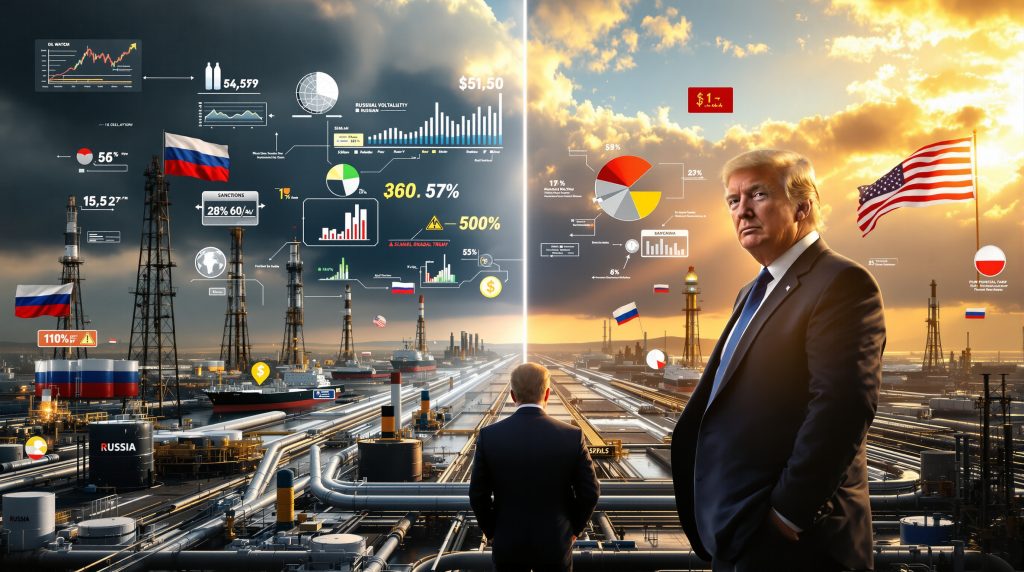Trump Sanctions Target Major Russian Energy Companies
The latest round of Trump sanctions Russian oil giants has sent shockwaves through global energy markets, marking a significant escalation in economic pressure on Moscow's war machine. Furthermore, these comprehensive measures target some of Russia's most critical petroleum infrastructure and shipping networks.
The sweeping sanctions package represents one of the most aggressive moves against Russian energy interests since the conflict began. Moreover, the timing coincides with crucial OPEC production impact discussions that could reshape global supply dynamics.
Which Russian Oil Companies Face New Restrictions?
The sanctions specifically target Rosneft and Lukoil, Russia's two largest petroleum producers. These companies collectively control approximately 3.1 million barrels per day of crude production, representing a substantial portion of Russia's energy exports.
Additionally, the measures extend beyond production companies to include:
- 50+ oil tankers in Russia's shadow fleet
- Key petrochemical facilities
- Critical pipeline infrastructure
- Major refining operations
The comprehensive nature of these restrictions demonstrates the administration's commitment to disrupting Russia's energy revenue streams. However, the Trump tariffs implications extend far beyond energy markets.
How Are Global Energy Markets Responding?
Brent crude prices surged immediately following the announcement, climbing $5 per barrel within hours of the news breaking. Consequently, this price movement reflects market concerns about potential supply disruptions and geopolitical tensions.
The oil price movements have been particularly volatile as traders assess the long-term implications. Furthermore, energy analysts warn that sustained pressure on Russian exports could trigger broader market instability.
International benchmark prices now face upward pressure from multiple factors:
- Reduced Russian export capacity
- Uncertainty over alternative supply sources
- Increased shipping costs due to sanctions
- Market speculation about further restrictions
What Is Europe's Response Strategy?
European Union officials have coordinated closely with Washington on implementing what they term the "19th sanctions package". This collaboration ensures maximum impact whilst minimising disruption to European energy security.
Moreover, EU energy ministers have accelerated discussions about diversifying supply chains. The bloc continues reducing dependence on Russian energy imports, building upon previous diversification efforts that began in 2022.
Key European initiatives include:
- Enhanced LNG import capacity
- Expanded renewable energy programmes
- Strengthened partnerships with alternative suppliers
- Improved energy storage infrastructure
The Trump oil tariffs rally has further complicated European energy planning, as officials navigate competing policy pressures.
Shadow Fleet Operations Under Scrutiny
The sanctions particularly target Russia's "shadow fleet" of oil tankers, which have facilitated continued exports despite previous restrictions. These vessels often operate with inadequate insurance coverage and questionable safety standards.
Furthermore, maritime authorities report that shadow fleet vessels frequently engage in ship-to-ship transfers to obscure cargo origins. Such practices have enabled Russia to maintain export revenues whilst circumventing earlier sanctions measures.
According to US Treasury officials, the new measures will significantly impact these deceptive shipping practices. Additionally, international maritime organisations are implementing enhanced monitoring systems.
Enhanced Monitoring Measures
Recent intelligence suggests these vessels pose environmental and safety risks beyond their sanctions evasion activities. Consequently, multiple maritime authorities have increased inspection protocols and tracking capabilities.
Economic Impact on Russian Energy Sector
Industry analysts estimate that Trump sanctions Russian oil giants could reduce Russian petroleum revenues by $10-15 billion annually. This substantial impact reflects the targeted companies' critical role in Moscow's energy export strategy.
However, the oil price crash dynamics remain complex, as various factors influence global pricing mechanisms. Market volatility continues as traders assess long-term supply implications.
Russian energy companies face immediate challenges including:
- Restricted access to Western technology
- Limited financing options for new projects
- Reduced export capabilities through traditional channels
- Increased operational costs due to sanctions compliance
Alternative Supply Chain Developments
Global energy markets are adapting to reduced Russian supply through enhanced partnerships with alternative producers. Middle Eastern and North American suppliers report increased demand from traditional Russian customers.
Furthermore, BBC analysis suggests that these market shifts could permanently reshape global energy trade patterns. The transition away from Russian supplies appears to be accelerating across multiple sectors.
Strategic Reserve Considerations
Several countries have announced plans to increase strategic petroleum reserves in response to market volatility. These moves aim to provide buffer capacity against potential supply disruptions whilst markets adjust to new trading patterns.
Long-term Market Implications
The comprehensive nature of these sanctions suggests a fundamental shift in global energy trade relationships. Moreover, industry experts predict that Trump sanctions Russian oil giants will have lasting effects on international petroleum markets.
Energy security concerns are driving accelerated investment in renewable technologies and alternative supply sources. Consequently, traditional energy trade patterns may never fully return to pre-sanctions configurations.
Market participants must now navigate:
- Increased price volatility
- Supply chain uncertainty
- Enhanced compliance requirements
- Evolving geopolitical risks
These factors collectively suggest that energy markets will remain turbulent as participants adapt to the new regulatory environment and its long-term implications for global trade.
Seeking Investment Opportunities in Energy Market Volatility?
Discovery Alert's proprietary Discovery IQ model delivers real-time alerts on significant ASX mineral discoveries, helping subscribers identify actionable opportunities as global energy shifts drive increased demand for critical minerals. Begin your 30-day free trial today at Discovery Alert and position yourself ahead of market movements that could reshape commodity landscapes.




